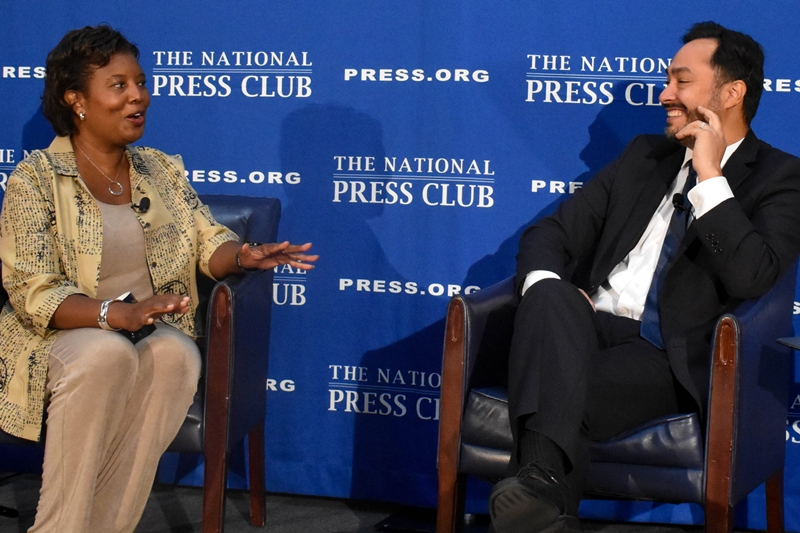Rep. Castro urges more Latinos in media, prescribes Congressional action if needed

Rep. Joaquin Castro, D-Texas, said production tax credits given to film makers should be reconsidered if Latinos continue to remain underrepresented in the industry at a Sept. 21 National Press Club Newsmaker event.
His comments came in the wake of a report by the Government Accountability Office that found that Latinos account for about 12 % of the media industry’s employees, despite accounting for 19 % of the US population. And within the media industry, Latinos are overrepresented in lower paying service sector jobs, while accounting for only 4 % of directors and 7 % of lead or co-lead actors.
“The media industry, and Hollywood in particular, is still the main image defining and narrative creating institution in American society, and Latinos are still largely invisible in this industry,” he said.
The representative took aim at the news industry as well, stating that Latinos account for 5 to 7 % of employees at The New York Times and Washington Times, and 17 % at The Los Angeles Times, which represents a city where nearly half of the population is Latino. He also cited research by archivist Erin Overby finding that The New Yorker magazine has not published a single cinema review by writers or critics of color in the last thirty years.
“The fact is that the worst offenders in industry are actually news organizations and publishing houses,” Castro said.
The representative has organized visits with a variety of companies in the film, news and publishing industries to address the underrepresentation of Latinos in their workforce. During one of the visits Castro asked the CEO of a major publishing house to name three Latinos who played a prominent role in US history. After thinking it over for a while, finally he said, ‘No, I can’t,’” Castro said.
The lack of Latino representation in the workforce, print and screen has left a black hole that has been filled by stereotypes of Latinos as gangsters and illegals, and Latinas as hyper-sexual, Castro said.
“I felt like it was one of those things that there was always something more immediate that I had to get to,” Castro said. But the 2019 mass shooting in El Paso, Tex., spurred him to make Latino representation in Hollywood and media a priority.
“It was what happened in August of 2019 in El Paso, when this man basically bought wholesale into the stereotypes about Latinos, both the historical stereotypes that have come out in entertainment and American media as Latinos as illegals and so forth, but also those stereotypes then getting abused in my world in my world of politics by politicians. That dangerous combination led this man to believe that Latinos were invaders to Texas. I really went for it at that point,” he said.
The speech occurred while Marvel’s first Asian superhero movie dominates the box office at theatres. But #EmmysSoWhite was simultaneously trending on Twitter because white actors swept all 12 major awards, a sign that the lack of diversity in the film and media industry remains pervasive and top of mind.
“No community should be asked to subsidize its own exclusion,” Castro said, referring to the production tax credits.
Castro said the GAO will issue another report on Latino employment in the media industry next year. It will include an inspection of the enforcement of anti-discrimination laws in the industry.
